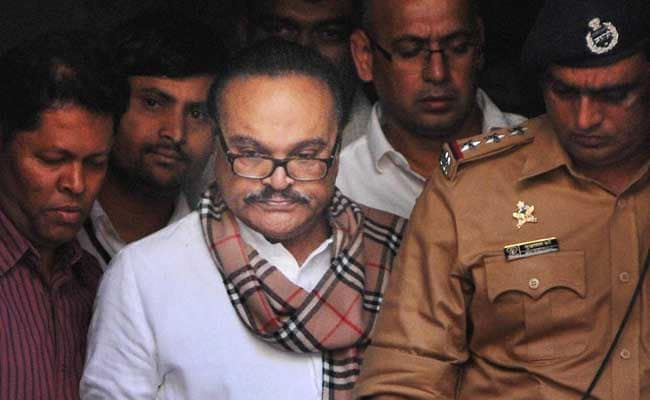
Bombay High Court has dismissed former Maharashtra minister Chhagan Bhujbal's bail plea
Mumbai:
The Bombay High Court today dismissed former Maharashtra minister Chhagan Bhujbal's petition seeking bail and challenging his arrest under the Prevention of Money Laundering Act.
"We are dismissing the petition. A detailed order will be given later," said a division bench of justices Ranjit More and Shalini Phansalkar-Joshi.
Mr Bhujbal, who is in judicial custody on charges of money laundering since March this year, had sought bail from the Bombay High Court on medical grounds saying his arrest by Enforcement Directorate (ED) was not as per the procedures established by law.
The NCP leader had filed a Habeas Corpus petition seeking bail, saying his "arrest" was illegal.
On December 5, Mr Bhujbal's lawyer Vikram Chaudhary had argued that his client should be enlarged on bail since he was not well and undergoing treatment in a hospital in Mumbai.
The lawyer had said that the lower court rejected Mr Bhujbal's bail on medical grounds twice. He, however, has not sought regular bail from the trial court.
Mr Chaudhary had argued that ED had not provided the grounds of arrest to Mr Bhujbal, in keeping with the provisions of section 19 of Prevention of Money Laundering Act (PMLA). Hence, his arrest was illegal and he should be granted bail, the lawyer had said.
Mr Bhujbal was arrested on March 14 this year by the Enforcement Directorate in connection with the Maharashtra Sadan scam and Kalina land case in which he and his relatives were alleged to have received kickbacks.
After his arrest, he had approached the high court challenging the constitutional validity of sections 19 and 45 of the PMLA.
Section 19 of PMLA empowers the ED to arrest an accused based on evidence gathered by the agency against the individual, while section 45 deals with bail of the accused.
However, Mr Bhujbal withdrew his petition and filed a fresh plea in the form of a Habeas Corpus petition challenging his arrest and seeking bail.
Habeas Corpus is a recourse in law whereby a person can report an unlawful detention or arrest.
Earlier, on November 22, the ED had opposed Mr Bhujbal's bail saying he had filed the Habeas Corpus petition too late, since he was in custody for nearly eight months.
Why did he not file such a plea earlier? Additional Solicitor General Anil Singh, appearing for ED, had then argued.
"We are dismissing the petition. A detailed order will be given later," said a division bench of justices Ranjit More and Shalini Phansalkar-Joshi.
Mr Bhujbal, who is in judicial custody on charges of money laundering since March this year, had sought bail from the Bombay High Court on medical grounds saying his arrest by Enforcement Directorate (ED) was not as per the procedures established by law.
The NCP leader had filed a Habeas Corpus petition seeking bail, saying his "arrest" was illegal.
On December 5, Mr Bhujbal's lawyer Vikram Chaudhary had argued that his client should be enlarged on bail since he was not well and undergoing treatment in a hospital in Mumbai.
The lawyer had said that the lower court rejected Mr Bhujbal's bail on medical grounds twice. He, however, has not sought regular bail from the trial court.
Mr Chaudhary had argued that ED had not provided the grounds of arrest to Mr Bhujbal, in keeping with the provisions of section 19 of Prevention of Money Laundering Act (PMLA). Hence, his arrest was illegal and he should be granted bail, the lawyer had said.
Mr Bhujbal was arrested on March 14 this year by the Enforcement Directorate in connection with the Maharashtra Sadan scam and Kalina land case in which he and his relatives were alleged to have received kickbacks.
After his arrest, he had approached the high court challenging the constitutional validity of sections 19 and 45 of the PMLA.
Section 19 of PMLA empowers the ED to arrest an accused based on evidence gathered by the agency against the individual, while section 45 deals with bail of the accused.
However, Mr Bhujbal withdrew his petition and filed a fresh plea in the form of a Habeas Corpus petition challenging his arrest and seeking bail.
Habeas Corpus is a recourse in law whereby a person can report an unlawful detention or arrest.
Earlier, on November 22, the ED had opposed Mr Bhujbal's bail saying he had filed the Habeas Corpus petition too late, since he was in custody for nearly eight months.
Why did he not file such a plea earlier? Additional Solicitor General Anil Singh, appearing for ED, had then argued.
Track Latest News Live on NDTV.com and get news updates from India and around the world

